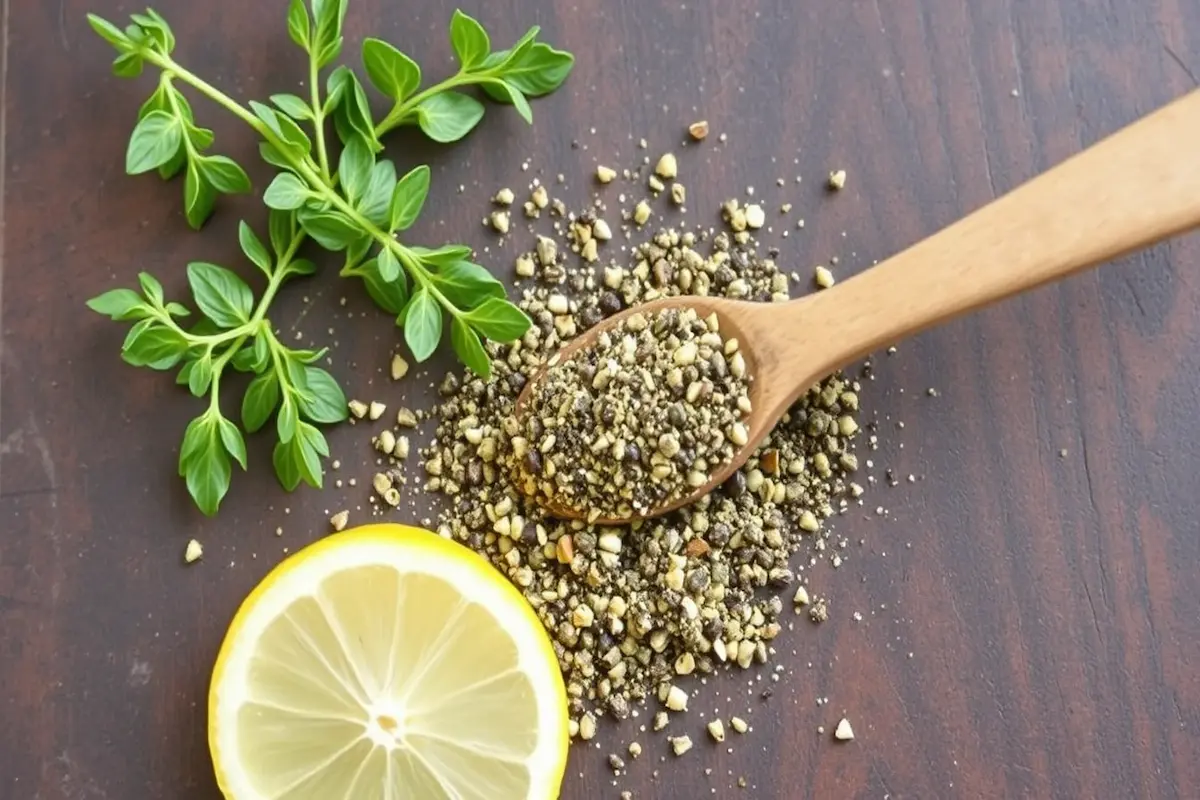Lemon pepper seasoning is a versatile blend that brings a zesty and peppery flavor to a variety of dishes. Its unique combination of lemon zest and cracked black pepper has made it a staple in kitchens worldwide. In this comprehensive guide, we’ll explore the origins, composition, culinary uses, health benefits, and how to make your own lemon pepper blend at home.
Introduction to Lemon Pepper Seasoning
Lemon pepper seasoning is a blend of dried lemon zest and cracked black peppercorns, often combined with additional spices like garlic powder and onion powder. This seasoning imparts a bright, tangy, and mildly spicy flavor to dishes, making it a popular choice for enhancing the taste of poultry, seafood, vegetables, and more.
Historical Background
The exact origins of lemon pepper blend are not well-documented, but it has been a part of culinary traditions for decades. Its commercial popularity surged in the late 20th century, particularly in the United States, where it became a favored seasoning for various dishes, especially lemon pepper wings, a dish that originated in Atlanta, Georgia.
Composition and Ingredients
The primary components of lemon pepper blend include:
- Lemon Zest: Provides the citrusy aroma and tangy flavor.
- Black Pepper: Adds a sharp, pungent heat.
- Salt: Enhances overall taste.
- Optional Additions: Garlic powder, onion powder, and sometimes sugar or citric acid for added depth and balance.
Commercial blends may contain preservatives and artificial flavors, but homemade versions allow for control over the ingredients, resulting in a fresher and more natural taste.
Flavor Profile
The combination of lemon zest and black pepper creates a seasoning that is:
- Citrusy and Tangy: From the lemon zest.
- Pungent and Spicy: Due to the black pepper.
- Savory: Enhanced by additional spices like garlic and onion powder.
This harmonious blend elevates the flavor profile of various dishes, adding brightness and complexity.
Culinary Uses of Lemon Pepper Seasoning
Lemon pepper blend is incredibly versatile and can be used in numerous culinary applications:
- Poultry: Sprinkled on chicken before grilling or baking to add zest.
- Seafood: Enhances the flavor of fish, shrimp, and other seafood.
- Vegetables: Adds a tangy kick to roasted or steamed vegetables.
- Pasta: Mixed into pasta dishes for added depth.
- Marinades and Dressings: Incorporated into marinades for meats or salad dressings for a citrusy punch.
Its adaptability makes it a go-to seasoning for adding flavor without extra calories or fat.
Health Benefits and Nutritional Information
Lemon pepper seasoning offers several health benefits:
- Low in Calories: Provides flavor without adding significant calories.
- Rich in Antioxidants: Both lemon zest and black pepper contain compounds that combat oxidative stress.
- Digestive Aid: Black pepper stimulates digestive enzymes, aiding digestion.
- Immune Support: Lemon zest is high in vitamin C, which supports the immune system.
However, it’s important to monitor sodium content, especially in commercial blends that may contain added salt.
Homemade Lemon Pepper Seasoning Recipe
Creating your own lemon pepper seasoning at home ensures freshness and allows you to control the ingredients. Here’s a simple recipe:
Ingredients
- 4-5 Fresh Lemons: Zested.
- 2 Tablespoons Coarsely Ground Black Pepper: Adjust to taste.
- 1 Tablespoon Flaky Sea Salt: Optional.
- 1 Teaspoon Garlic Powder: Optional.
- 1 Teaspoon Onion Powder: Optional.
Instructions
- Prepare the Lemon Zest: Zest the lemons, avoiding the bitter white pith.
- Dry the Zest: Spread the zest on a parchment-lined baking sheet and dry in the oven at the lowest temperature (around 170°F or 75°C) for 30-60 minutes until completely dry.
- Combine Ingredients: In a bowl, mix the dried lemon zest, black pepper, salt, garlic powder, and onion powder until well combined.
- Store: Transfer the seasoning to an airtight container and store in a cool, dry place.
This homemade blend can be stored for up to six months, retaining its vibrant flavor.
“Learn more about drying lemon zest effectively for seasoning” (Live Eat Learn).
Popular Recipes Featuring Lemon Pepper Seasoning
Lemon pepper seasoning can be the star ingredient in various dishes:
Lemon Pepper Chicken Wings
Crispy chicken wings tossed in lemon pepper seasoning make for a flavorful appetizer or main course. This dish is especially popular in Atlanta, where it originated.
Lemon Pepper Shrimp
Sauté shrimp with lemon pepper seasoning for a quick and delicious meal that pairs well with pasta or rice.
Lemon Pepper Roasted Vegetables
Toss your favorite vegetables in olive oil and lemon pepper blend, then roast until tender for a zesty side dish.
Lemon Pepper Pasta
Combine cooked pasta with a lemon pepper cream sauce for a tangy and comforting dish.
Cultural Significance and Popularity
Lemon pepper seasoning has earned a cultural following, particularly in the Southern United States. Its fame skyrocketed thanks to the popularity of lemon pepper wings in Atlanta, which have become a symbol of the city’s unique culinary scene. Across the globe, its versatility and vibrant flavor profile have ensured its spot in pantries and restaurant menus alike.
Commercial Availability and Brands
The convenience of pre-made lemon pepper seasoning has led to its widespread availability in grocery stores and online marketplaces. Here are some key points to consider:
- Popular Brands: McCormick, Lawry’s, and Trader Joe’s are just a few of the trusted brands that offer high-quality lemon pepper seasoning blends. These products often include balanced flavors, making them an excellent choice for home cooks.
- Cost and Accessibility: Commercial blends are typically affordable and widely available, making them a convenient option for those who don’t want to make their own.
- Homemade vs. Store-Bought: While store-bought blends save time, homemade versions provide better control over ingredients, especially if you’re mindful of salt or prefer organic components.
When choosing a brand, always read the ingredient list to avoid additives or excessive sodium.
Frequently Asked Questions (FAQs)
To address common queries about lemon pepper seasoning, we’ve compiled a list of frequently asked questions:
What is lemon pepper seasoning made of?
It’s a mix of dried lemon zest, cracked black pepper, and often salt, garlic powder, and onion powder. These ingredients combine to create a tangy and peppery flavor profile.
How do you make lemon pepper seasoning at home?
Simply zest fresh lemons, dry the zest, and mix it with cracked black pepper and optional spices. The homemade version allows for customization and ensures a fresh, preservative-free seasoning.
What dishes can I use lemon pepper blend in?
Lemon pepper seasoning is versatile and pairs well with poultry, seafood, vegetables, pasta, and marinades. It’s also a great addition to dips and salad dressings for a zesty kick.
Is lemon pepper blend healthy?
Yes, especially when made at home. It’s low in calories and contains antioxidants from lemon zest and digestive benefits from black pepper. However, monitor the sodium levels in store-bought blends.
How should I store lemon pepper seasoning?
Store it in an airtight container in a cool, dry place. Homemade blends typically last up to six months while retaining their vibrant flavor.
Suggested Internal Links for Enhanced Context
To make this article more engaging and informative, here are some suggested internal links from the Crisp Fresh Recipes website that align with this content:
- Link to “Crispy Lemon Pepper Wings Recipe” for step-by-step instructions on making a popular dish featuring this blend.
- Link to “Top 10 Seasonings for Grilling” for a broader look at other spices that pair well with grilled dishes.
- Link to “Homemade Spice Blends You Can Make Today” for a collection of DIY spice recipes that complement lemon pepper seasoning.
Conclusion: Why Lemon Pepper Seasoning Should Be a Pantry Staple
In conclusion, lemon pepper blend is a must-have for any kitchen. Its tangy, spicy flavor elevates an incredible range of dishes, from lemon pepper wings to fresh seafood and roasted vegetables. The option to create your own blend ensures freshness and allows you to customize the seasoning to your liking, while commercial blends provide a convenient alternative for quick meal prep.
Whether you’re a seasoned chef or a home cook exploring new flavors, adding lemon pepper blend to your pantry is a step toward unlocking culinary creativity. Its versatility, health benefits, and robust taste make it a timeless addition to countless recipes. Try it in your next dish and discover the zest and spice it brings to your table!


4 thoughts on “The Ultimate Guide to Lemon Pepper Seasoning: History, Uses, and Recipes”